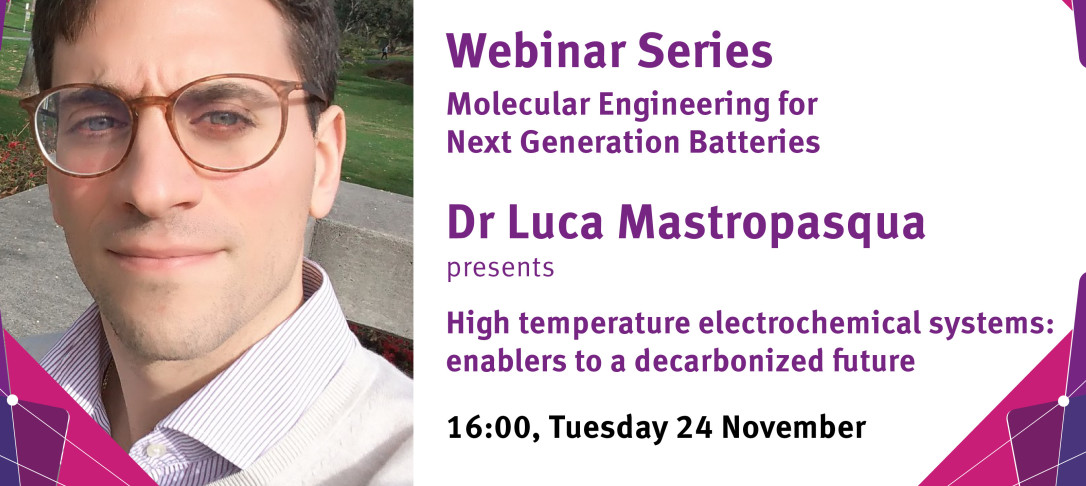
IMSE Webinar Series
Molecular Engineering for Next Generation Batteries
The challenge that will be discussed in this session is:
High temperature electrochemical systems: enablers to a decarbonized future
Join us for this informal webinar with Dr Luca Mastropasqua. There will be an opportunity for question and answer after the presentation. To join this webinar you must register in advance and you will be emailed the joining instructions for the webinar.
Abstract
Electrochemical Energy Conversion and Storage (EECS) systems will soon become ubiquitous, and research focusing on their fundamental electrochemical, thermodynamic, and chemical phenomena seeks to optimize their impact. One rich field of research focuses on how to optimally integrate EECS into functional systems for decarbonizing challenging sectors such as power generation, aviation, shipping, heavy duty transport, and industrial processes (e.g., steel, cement, ammonia, and pharmaceuticals production). These sectors comprise most of the man-made CO2 currently emitted in the atmosphere, and constitute the most difficult application to decarbonize via electrification.
This seminar explores the fundamentals, economics, potential, and challenges these systems present. Topics include how high temperature electrochemical cells based on solid oxide, molten salts or proton conductor materials may be effectively integrated into industrial and power generation processes. It will discuss the unique capabilities of EECS operated as fuel cells (performing direct electro-oxidation of fuel species) to enable high energy conversion efficiencies, fuel flexibility, highly dynamic operation, virtually zero criteria pollutant emissions, and the integration with carbon capture and storage (CCS). The seminar also dives into the economics of electrochemical systems, demonstrating that these systems are scalable and can support the development of low-carbon multi-energy systems – characterised by the production of multiple useful goods (i.e., electricity, heating, cooling, synthetic chemicals).
EECS operated as electrolysers produce useful products via direct electro-reduction of chemicals with low economic value and can repurpose waste streams into valuable commodities or specialty products. This seminar will examine direct electro-reduction of steam using renewable energy sources for green hydrogen production demonstrating the technical feasibility of direct coupling with fluctuating solar and wind resources. Additionally, electrolysis or co-electrolysis with cheap renewable energy of steam and CO2 and nitrogen into syngas (H2, CO, methane) or other chemical products such as ethylene, ammonia or methanol constitute a unique possibility for decarbonising notoriously difficult-to-decarbonise sectors. Challenges related to cost reduction, increase of cell and stack durability, thermal management, system integration, scale-up and control dynamics will be discussed. Moreover, recent experimental campaigns support the prediction for low degradation and high efficiency when high temperature EECS are directly coupled to wind and solar systems.
Finally, it is suggested that current chemical industry manufacturing routes progress with constant but slow improvements already close to their performance limits. New disruptive technologies – possibly electrochemical – are needed to unlock major advancement in chemical manufacturing and process industry.
Biography
Dr. Luca Mastropasqua is currently a Senior Research Scientist at University of California, Irvines National Fuel Cell Research Center (NFCRC), a leader in studying electrochemical energy conversion systems for renewable hydrogen and fuel production, power generation, carbon capture and low emission industrial processes. Dr. Mastropasqua’s research focuses on how integration of high temperature electrochemical technologies can decarbonize sectors such as aviation, freight, shipping, steel production, data centres, and waste water treatment. Current projects and partnerships include decarbonization of Microsoft data centres with green hydrogen, development of hybrid fuel cell-gas turbine cycles with FuelCell Energy and a recent $5.7M award from the U.S. Department of Energy to decarbonize steel production. He has currently published 15 papers in peer reviewed journals and has written and contributed to numerous research proposals addressing these subjects.
Dr. Mastropasqua has previously worked as a Postdoctoral Associate at Princeton University, where he worked on integrating Molten Carbonate Fuel Cells in the process industry. The project was pursued at the Andlinger Center for Energy and the Environment within the Princeton E-ffiliates Partnership, with funding by ExxonMobil, and with the collaboration of Politecnico di Milano. Dr. Mastropasqua received his PhD cum laudae from Politecnico di Milano in 2017 in Energy and Nuclear Science and Technology with a thesis on “Clean Energy Conversion Systems: High Temperature Solid Oxide Electrochemical Membranes in Advanced Power Generation Applications”.
If you have any questions about accessibility requirements please email Leah Adamson (IMSE Events Officer) on l.adamson@imperial.ac.uk
More Webinars in the Molecular Engineering in next Generation Batteries Webinar Series
- 17 September Sustainable and Structural Supercapacitors presented by Dr Servann Herou and Dr Evgeny Senokos
- 24 September Machine learning methods for battery electrode characterisation and optimisation presented by Steven Kench
- 8 October Understanding the Factors Governing the Performance of Garnet Electrolytes in Li Metal Batteries Dr Ainara Aguadero and Dr Federico Pesci
- 15 October Sustainable Glycerol Electrolysis for Co-production of Hydrogen and Value-added Chemicals presented by Dr Hui Luo
- 12 November Multi-scale Modelling of High Energy Density Supercapacitors presented by Dr Tribeni Roy
- 19 November Modelling for Design of Next-Gen Energy Storage Devices presented by Dr Ganesh Madabattula
- 26 November Development of Low-cost Alkaline Polysulphide-Air Redox Flow Batteries presented by Dr Yuhua Xia
- 3 December Gas-solid Interactions in Fuel Cell Electrode Materialsby Dr Paul Boldrin